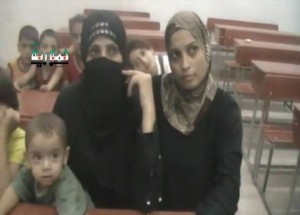War Forces Syrian Women into Workforce

Mariam Abdullah *
Editor’s Note: The editorial team has changed the names of some of the speakers for their own safety.
(Damascus, Syria) — A 40-year old woman who calls herself Zainab, 40, prepares to light the burner in her ghazleh cart, where she makes a sweet snack similar to cotton candy. She is parked outside a school that shelters displaced people in one of Damascus’s suburbs still controlled by the Syrian government.
Zainab and her family fled Idlib and took shelter in the school, where they share a single room with three other families. They have been displaced three times.

“I never expected to one day take my husband’s place by selling ghazleh, but he was arrested at a checkpoint five months ago, leaving me no other option if I am to meet our basic needs,” she said.
Zainab has had difficulty coping with her new reality. Before they fled, she and her husband owned their land and a bicycle workshop, which he managed. They used to cultivate their own olives.
Zainab is one of many displaced Syrian women who has been pushed into the workforce by Syria’s conflict. There are no studies on the numbers of women who are now supporting their families, but many of the staff working in shelters in Damascus and the surrounding suburbs say they see many such cases, especially compared to before the war, when the number of working women was relatively small. The most recent figures, from 2010, show that only 13 per cent of women in Syria were working outside the home, according to a study by the International Labor Organization.
Many women who spoke to The Damascus Bureau at the school where Zainab lives and works said they have replaced the men as the breadwinners in their families after their husbands, fathers or brothers were killed, arrested, or lost their income.
Um Rifaat, 28, moved to the refugee centre after her family’s home in the Damascus suburb of Jobar was destroyed and its contents looted. Each day, she returns from her job in a workshop that makes qamareddine, a dried apricot dessert, and has to clean her small corner of the shelter and prepare food and tea for her husband, who is often grumpy.
Um Rifaat said her husband is resentful because he lost his job at a shop that produces Arabic sweets. But he is not the only one to have lost a source of income; Um Rifaat also lost her contracted job at a cheese factory in a suburb of Damascus after it closed its doors because of the fighting. The contract for the job that she lost was registered with the government’s General Association for Social Insurance, while her current job is only seasonal.
Now, she has to commute two hours to work, which pays her 10,000 Syrian Pounds a month, or about US$100, which is considered low after the recent hike in prices.
Um Rifaat says she has no choice but to work, despite the instability and danger of the general situation.
Maha, 34, is a nurse who also lives in the school. She provides medical services to the other displaced people for very small sums. Her husband is an unemployed butcher who sometimes works in the centre’s kitchen.
Maha says a lot of men depend on women to secure the family’s income; the men claim the security risks are higher for them.
“Men here at the centre are happy to sit around without work,” says Maha. “They turn down jobs they don’t like, or fear arrest, kidnapping or snipers.”
She adds that men believe women will not be affected by cleaning stairs or working as a maid or a seamstress because they are working in “safe places.”
Most of the displaced women who are working perform some kind of handiwork, says Salam, a psychologist working on women and children’s issues in more than one centre for displaced people in Damascus.
She says that women are forced to accept jobs in the informal labour market in order to replace the incomes that men no longer contribute to their families. A result of working in the informal market is that families lose access to insurance and health care.
Mustafa, a social worker who previously worked with Iraqi refugees in Syria, says that women should be supported and empowered as they enter the workforce through educational and social programs. These activities can even be held in the shelters. Nongovernmental organisations have already launched a few such initiatives in some shelters aimed at training women in craftwork, such as sewing or making bags.
“It is vital to make women feel appreciated, especially in front of others, for their steadfastness in the face of crisis,” he said. “Rather than pitying them, there should be serious efforts to teach them practical economic skills that will increase their access to employment.”
Mustafa added that women’s involvement in social activities is also hugely important for staving off loneliness, isolation, depression and anxiety and also improves their standing in society.
With the crisis showing no signs of ending soon, displaced women say they will continue to seek employment, despite the hardships they face.
Um Rifaat says she is prepared to bear the difficult work of preparing qamareddine, adding: “in the past, my husband made sure I wanted for nothing. This is my family, my children, and I will not allow them be in need while I am capable of working.”
* Mariam Abdullah is a pseudonym for a journalist living in Syria
